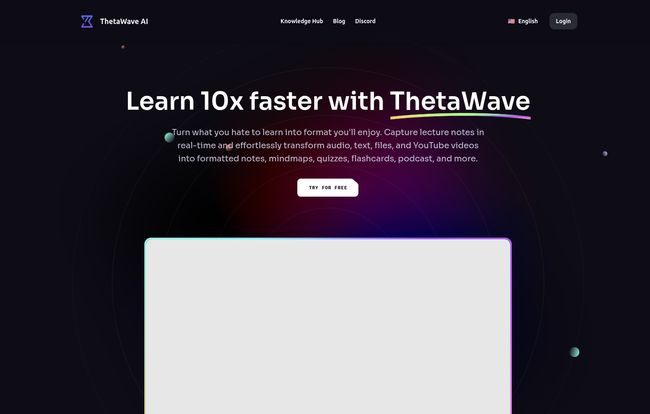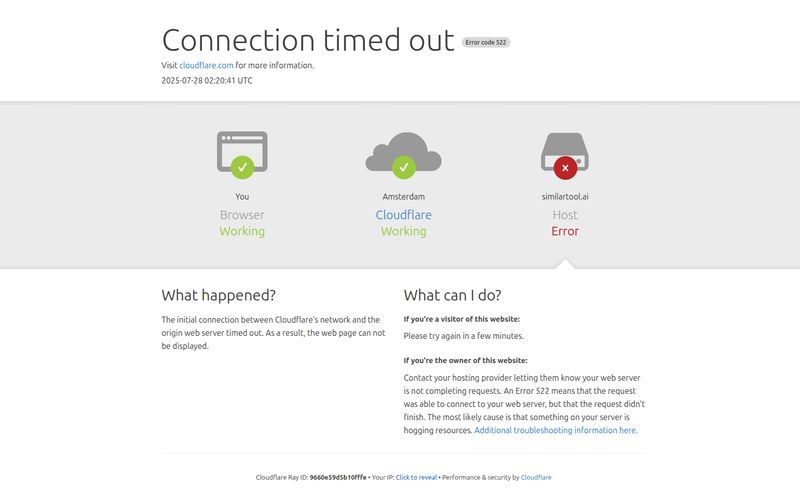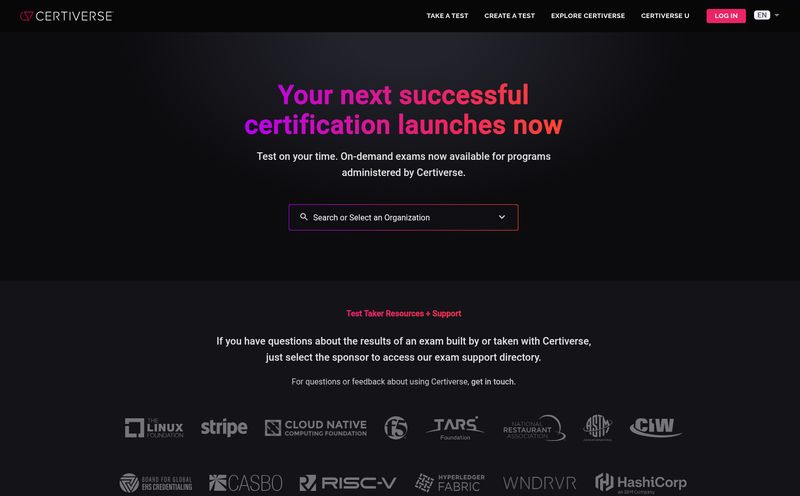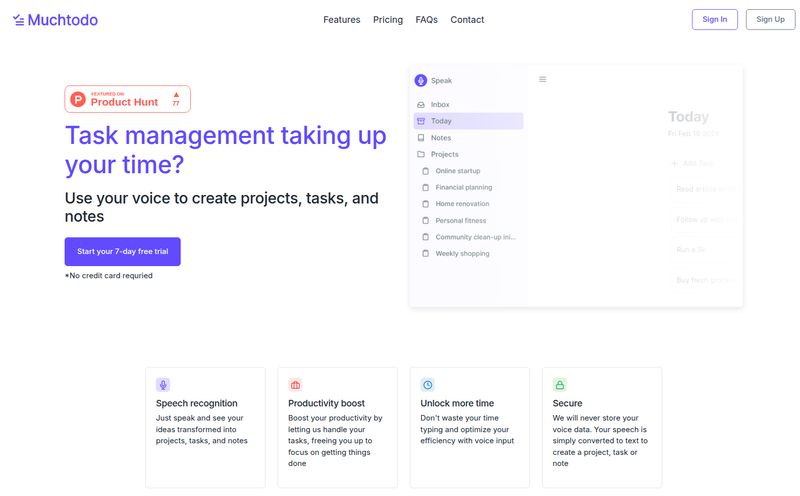I still have nightmares about my freshman year biology lecture notes. Seriously. It was an 8 AM class in a cavernous hall, and the professor spoke at the speed of a caffeinated hummingbird. My notes were a chaotic jumble of half-finished sentences, frantic arrows pointing to nowhere, and doodles of despair. I'd leave that lecture hall feeling like I’d been hit by an information truck, with a notebook full of gibberish to show for it.
Sound familiar? The struggle is real. For decades, the student's primary tool has been the pen or the keyboard, racing to capture every pearl of wisdom. But what if you didn't have to? What if you could just… listen? And then have perfect, structured, and even interactive notes waiting for you?
This isn’t some far-off sci-fi dream. It’s the promise of tools like Thetawave AI, and as someone who has spent years watching digital trends, I've got to say, the new wave of AI study tools is genuinely intriguing. But are they actually effective, or just another tech gimmick? Let's get into it.
So What Exactly is Thetawave AI?
Okay, let's break it down. Calling Thetawave AI just a “note-taker” is like calling a Swiss Army knife just a knife. It’s technically true, but it misses the entire point. At its core, Thetawave AI is a knowledge conversion engine built specifically for the student brain. You feed it raw information—a live lecture, a recording, a dense PDF, even a long-winded YouTube documentary—and it processes it.
It doesn't just spit out a word-for-word transcript (though it does that too). It chews on the content and then reframes it into things you can actually use to study. Think of it as your own personal teaching assistant. You attend the lecture, and it handles all the tedious administrative work of organizing the knowledge, leaving you free to actually absorb the concepts.
The Core Features That Actually Matter
A feature list on a website is one thing. But what are the parts that will actually change your study habits? I’ve seen a million platforms with bloated features nobody uses. Here’s what stood out to me with Thetawave.
From Lecture Babble to Structured Brilliance
This is the headline feature. You can essentially hit record during a lecture (either in person or online), and the AI transcribes it in real-time. But the magic is in the “structured notes” part. It identifies main topics, sub-points, key terms, and formats them beautifully. It even handles things like formulas and tables. So instead of a wall of text, you get an organized document that looks like something you’d actually want to study from.
The YouTube and Document Digester
This one’s a big deal. We all know that half of learning these days happens on YouTube. Your professor recommends a 90-minute documentary, or you find a great explainer video. Who has time to sit and take notes on all that? With Thetawave, you can just drop the link in, and it does the work for you. Same goes for those monster PDFs or Word docs your professor uploads. It’s like having a digital sous-chef for your brain, doing all the tedious chopping and prep work.

Visit Thetawave AI
Not Just Notes, but a Full Study Suite
This is where Thetawave pulls away from simple transcription services. It takes the notes it generated and automatically creates study tools from them. We're talking:
- AI-Powered Quizzes: It generates practice questions based on the material to test your knowledge. This is huge for active recall, which learning science folks like Pooja K. Agarwal, Ph.D., have shown is way more effective than just re-reading notes.
- Flashcards: Classic, but effective. It pulls key terms and concepts and turns them into digital flashcards.
- Mind Maps: For us visual learners, this is gold. It creates a branching mind map of the topic, showing how all the ideas connect. It’s one thing to read a list of facts; it's another to see them laid out spatially.
- Personalized Podcasts: This one's wild. It can turn your notes into a podcast you can listen to. Perfect for reviewing material on your commute, at the gym, or while doing chores.
My Honest Take: The Good, The Bad, and The "Hmm..."
Look, no tool is perfect. As an SEO and traffic guy, I see a LOT of software that promises the world. Here's my unfiltered perspective on Thetawave AI.
The good stuff is pretty obvious. The time-saving aspect is immense. The hours you’d spend transcribing and organizing are now free for, you know, actually learning the material. Or sleeping. Both are important. The ability to process multiple formats (audio, YouTube, docs) makes it a super versatile hub for all your course content.
But let's have some real talk about the downsides. First, the “AI crutch” argument. Some might say that offloading note-taking means students won't develop active listening and synthesis skills. I get it. But my take? A calculator didn’t stop us from learning math concepts; it just handled the tedious computation. I see this in the same light. It's a tool to augment your learning, not replace your brain. You still have to engage with the quizzes and mind maps for it to work.
Then there's accuracy. AI transcription has gotten scarily good, but it's not flawless. A professor with a thick accent, a noisy lecture hall, or complex, niche terminology could still trip it up. You absolutely must review the generated notes. Think of it as a very, very good first draft, not a finished masterpiece. And of course, there's the reliance on an internet connection, which can be a pain on spotty campus Wi-Fi.
Let's Talk Turkey: What's the Price Tag on Thetawave AI?
Alright, the question every student asks: how much does it cost? Thetawave AI operates on a subscription model. The main offering is the Pro plan, which comes in at $25.90 per month.
Now, I had to put on my detective hat for a moment looking at their pricing page, but it seems there's a much better deal if you go for the annual plan. The yearly price is listed as $118.80. If you do the math, that breaks down to just $9.90 per month. That’s a massive saving.
Is it worth it? Well, how much do you spend on coffee a month? For the price of two or three fancy lattes, you get a tool that could potentially save you dozens of hours and boost your grades. From that perspective, for the serious student, the annual plan seems like a pretty solid investment.
| Plan | Monthly Cost | Annual Cost (Monthly Equivalent) |
|---|---|---|
| Pro | $25.90 | $118.80 ($9.90/month) |
Who is This Really For? (And Who Should Skip It?)
This tool isn't for everyone. If you're a traditionalist who genuinely learns best by the slow, methodical process of hand-writing every note, this might just feel like a distraction. If you're in a program that's more hands-on and less lecture-based, the value proposition drops.
But if you're a student drowning in content-heavy courses—think history, law, biology, sociology—this could be a lifesaver. If you're a visual learner, the mind maps are a killer feature. If you have a long commute, the podcast feature is a game-changer. And if you, like my freshman-year self, struggle to keep up with fast-talking professors, this could be the single best investment you make in your education.
Frequently Asked Questions about Thetawave AI
- Can it handle different accents or noisy lecture halls?
- AI transcription is pretty advanced, but not perfect. A clear audio source will always yield better results. In a very noisy room or with a very strong, unfamiliar accent, you should expect to do some manual cleanup on the generated notes. It's a powerful assistant, not a miracle worker.
- Is there a free trial to test it out?
- The website doesn't explicitly advertise a free trial on the main pages. Your best bet is to visit their site directly and see if they have any introductory offers or a limited free plan to get a feel for the platform before committing.
- How secure is my data and my notes?
- This is a valid concern for any cloud-based service. Most reputable AI companies use standard encryption protocols to protect user data. I'd recommend reviewing their Privacy Policy (usually linked in the footer of their website) for specific details on how they handle your information.
- Can I export my notes to use them elsewhere?
- Yes, this is a key function. You wouldn't want your notes trapped in one ecosystem. You should be able to export your structured notes, mind maps, and other materials into common formats like PDF or text files for safekeeping or use in other apps.
- Does Thetawave AI work on my phone?
- Yes! The website clearly shows that they have apps available on both the Google Play Store and the Apple App Store, which is great for recording lectures and studying on teh go.
- Is it better than just using a simple transcription app?
- That depends on your goal. If you ONLY need a text transcript, a simpler tool might suffice. The real power of Thetawave is turning that transcript into a suite of interconnected study tools—quizzes, flashcards, mind maps. It's about a more holistic learning process, not just text capture.
The Final Verdict on Thetawave AI
So, is Thetawave AI the future of studying? Maybe. It represents a significant shift from passive note-taking to active, AI-assisted knowledge management. It’s not a magic wand that will get you an 'A' without any effort. You still have to do the work, engage with the material, and, most importantly, think.
But as a tool to handle the most tedious, time-consuming parts of being a student, it’s incredibly compelling. It clears the path of administrative clutter so you can focus on the actual journey of learning. For the right student, in the right major, this tool won't just be helpful; it could be transformative. And my inner 18-year-old self, lost in that biology lecture, is incredibly jealous.
Reference and Sources
- Thetawave AI Official Website
- Thetawave AI Pricing Page
- RetrievalPractice.org - A great resource on the science of learning and active recall.



